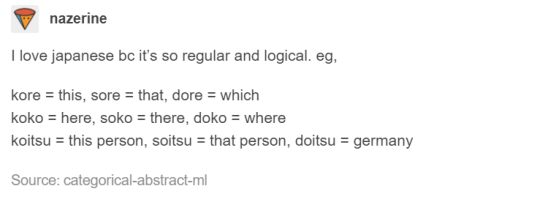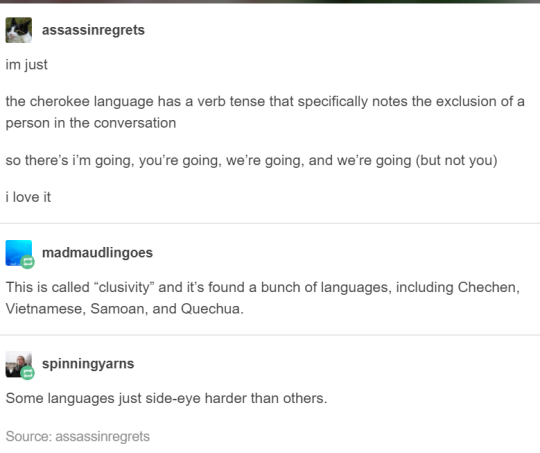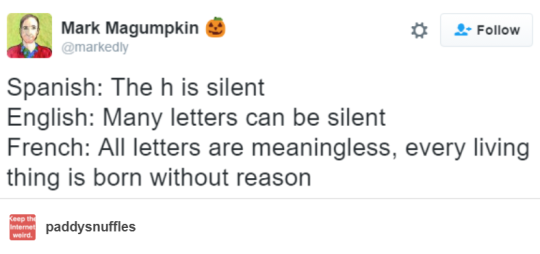#choctaw anumpa
Explore tagged Tumblr posts
Text
I know marvel had done bad things and are generally shitty in different ways but,,, having a Choctaw superhero/vigilante that isn't just "ooh city girl w long dark hair and a pair of beaded earrings" is so so healing. Actually hearing the Choctaw language is so healing. Seeing the cultural parts that get over looked by a lot of media portrayal, it's just good.
#plus Maya being dead + an amputee is so good#echo#choctaw#choctaw anumpa#choctaw Nation#csays#cthinks#marvel echo#edit: deaf* not dead smh sorry yall
24 notes
·
View notes
Text

ECHO will have a Choctaw Language (Chahta anumpa) Audio dub!
#echo#mcu#marvel#maya lopez#alaqua cox#choctaw#chahta anumpa#indigenous representation#native representation#language
211 notes
·
View notes
Text
Does anyone know of any good resources for learning Chahta Anumpa? I currently have two books, one on grammar and the other really. Isn't designed for self-teaching, the book itself says that. I like using Memrise courses and Quizlet, but those function better as study material. Is there any good Chahta coursework available? Online or not, I don't mind.
1 note
·
View note
Video
youtube
First, lemme say, as malihini (foreigner, guest) in Hawai'i nei, to learn ʻōlelo Hawaiʻi is our kuleana (both privilege+responsibility). Given the history and ongoing illegal occupation, learning even just a little ʻōlelo and doing our part to renormalize its day-to-day use is the least - and I do mean the bare minimum - I or anyone else visiting as tourist or living on this 'āina can do. And it should be done with respect for nā kānaka oiwi, their culture, and their ʻāina as language is not separate of these things.
I am no expert and clearly I still have a lot to learn and need all the help I can get, but if anyone else is eager to learn too, I'm happy to share some of the resources others have shared with me to supplement my online classes. Many are free and available online!
Now, having said that, e kala mai! Please don't take this as an invitation to roast me but if you're kānaka and/or nā po'e ʻōlelo Hawaiʻi, please do feel free to offer feedback! I am always eager to learn and practice with others!! I am truly humbled by the opportunity to do so.
For context, some friends and I were hoping to meet up via zoom last night to study and practice ʻŌlelo Hawaiʻi together. We are trying to meet up regularly to practice and encourage each other. Our goal for this week was to polish our ho'olauna (introductions). Unfortunately, we had to cancel/reschedule. But I've challenged myself to practice speaking every day (and not just practice my reading/writing comprehension), even if itʻs just for a few minutes. So.....
I recorded myself practicing and ya'll get to be my accountability buddies this time.
I've been learning 'Ōlelo Hawaiʻi online since this summer. One challenge I face no matter what language I speak (even English) is overcoming my social anxieties. I often freeze and/or nervously fumble over my words, particularly in group settings. Of course, this increases the less familiar I am with the language and/or culture. What fun! Aaaand Zoom classes tend to bump the dial up several notches and send my anxiety soaring through the roof. The emotional landscape of the state of the world certainly doesnʻt help either! So, Iʻm trying to make concerted efforts outside of class to help me lean into the challenges of learning online and my own discomfort. So, here we are...
Please note, this isn't my formal or more traditional ho'olauna but this is my effort to stretch and try to finds ways to speak to some of the many questions that often come up whenever I have to introduce myself, particularly when it comes to where I am "from"... Spoiler alert: I am a multi-ethnic Shimanchu, born on the island of Uchinaa but raised in the diaspora. You can call me Okinawan / Uchinaanchu or Ryukyuan / LooChooan but please know that I am NOT Japanese. Being given Japanese citizenship at birth does not erase the violent overthrow of our Kingdom and ongoing illegal occupation of the Loo Choo islands. No matter how much the Japanese government has tried to kill and/or beat or erase Shimanchu and the rich history and culture of the Loo Choo Kingdom, they cannot take away the blood that runs through my veins and the pride I hold in my heart for all of the gifts and lessons my ancestors have passed down to me.
Also, much like trying to learn my own heritage languages like Uchinaaguchi or Chahta Anumpa, it can be challenging to find folks who are both willing and able to practice indigenous languages, thanks to colonialism and the intergenerational trauma and institutional erasure or other barriers it creates/created. But I have been truly inspired by innovative and empowering ways indigenous brothers/sisters/siblings across the globe are leveraging technology to heal, connect, and overcome these hurdles, especially during these times of social distancing. (I mean, have yʻall been on TikTok??) So, here's my attempt to use technology to break down some of these barriers while also confronting some of my fears. Who knows...maybe itʻll inspire someone else to tackle some of your own fears, transform the way you think about technology, ....or perhaps (hopefully!) it'll make you pause to think about our individual and collective responsibility to decolonize ourselves and our communities and to honor the lands we call home - and the indigenous / aboriginal / First Nations peoples of the lands where we live - wherever in the world we find ourselves. (OK, gonna stop there for now before I start ranting about Asian Settler Colonialism, but consider this me lovingly calling in all Shimanchu here in Hawaiʻi to join me...)
OK. One minute challenge. Here we go!! *deep breaths*
#ʻolelo Hawaiʻi#hoʻolauna#hoʻomaʻamaʻa#e ola ka ʻōlelo#eolakaolelohawaii#Loo Choo#Ryukyu#Uchinaanchu#decolonize#indigenize#language endangerment#endangered language#language revitalization#choctaw#chahta anumpa#kuleana#sukubun#LearningInTheTimeOfCovid#TikTok#olelohawaii#LooChoo#Shimanchu#indigenous#renormalization
4 notes
·
View notes
Video
youtube
Halito! Chimachokma an?
In honor of the Year of Indigenous Languages, today I’m looking at Choctaw!
108 notes
·
View notes
Video
youtube
Native Tounges are powerful. Indigenous voices are strong.
35 notes
·
View notes
Text
I'm not gonna think too much about this one lest I submit to my hubris, but if there's any resources out there, I also wanna learn Chickashshanompa or Chata anumpa someday since I've got some Chickasaw and Choctaw in my family too. It's kinda tragic but the reason I focus so much on Cherokee is because it's been nearly impossible to learn anything reliable about the other two so far, and I kinda fixated out of grief from that.
I'm thinking I'm gonna pick up learning Tsalagi again once I get a dose of vyvanse that actually helps me focus and do stuff, because right now it mostly is just stabilizing my mood and making me vibe in one spot mindlessly all day.
#I've tried to learn about them from my mother but she said the same shit the other folks in the family said#AKA talking shit about the Chickasaw and Choctaw and reducing people from those tribes into bougie stereotypes#especially folks from the rezzes they get it extra heavy with the insults#and it sucks! I wanna know about my family and/or the tribes' cultures not the stereotypes around them you reduce them to!!
5 notes
·
View notes
Text

i got my first birthday card of the year!
it's in chahta anumpa (choctaw language)
chim = your
afvmmi = birthday
na yukpa = happy
14 notes
·
View notes
Text
Another Quote from the Choctaw Historical Records!
Back in the day in the Nation, all citizens were required to volunteer for road-building (usually in six day intervals) on pain of a small fine, and we’ve found after combing through years of data that not a single person was happy about it.
“Achaka̱ya ka̱ hina ikbi ekittanowo tok osh ellanola chin hosh anumpa kallo ishi hoki Lewis Shoal akosh ilanoli kat iyi hotopa im palʋmmi tok osh elanoli ho̱ Koat at inkashoffi hoki.” / “Then those who did not go to work on the road were taken and sworn to come and testify (as to why). Lewis Shoal testified that his feet ached badly, so the Court remitted (his fine).”
and not long after
“Macker Colbert at hina ikbi ikayo tok ʋt bok ia tok XXX akosh anokchito tok miha hok at i̱kashoffi hoki.” / “Mack Colbert said that he did not work the road because the creek was running too high and so he couldn’t cross (then) and (his fine) was remitted.”
(Quotes taken from the 1893 Red River County Court Affairs March)
4 notes
·
View notes
Text
Family history is fucking wild, man. Sometimes I think about the fact that my family tree on my dad's side just....stops after my great grandfather.
From what we do know, my great grandfather left home in 1903 at 14 years old and spent 4 years in Indian Territory free trapping with an old Native man (I think Choctaw?) named Old Man Parker. They kept free trapping together until that became illegal with Oklahoma statehood. Apparently he did a bunch of stuff like tracking and trapping on both sides of the new state lines until he decided he wanted a White Suburban Life, and he just...packed up and became a husband and father in some Arkansas town.
Beyond that, the man's a total mystery. He spoke the Choctaw language (basic googling says Chahta Anumpa?) fluently and flat refused to teach it to any of his kids. When asked about his parents, he said "my mama was mean so I left" and wouldn't say more than that.
And it's not like he had a birth certificate (my grandfather didn't have one either, and whoo buddy that's its own story), so we know nothing more than what he was willing to tell.
24 notes
·
View notes
Text

Weather: kucha [ko-cha] n. weather
Storm: kucha okpulo [ko-cha ok- pó-lo] n. bad weather, storm (sp. var. kucha)
|| Kucha okpulo yut minti. Bad weather is coming ||
October 6, 2016
Choctaw Weather
**Note: Any letter capitalized in the middle of a word is actually written as a lower case letter that is underlined, I wasn’t able to write it this way from my phone or in html. Underlined letters are our nasal letters so think of saying it with a slight n sound after the letter.
Himak nittak kucha yA katiohmi? This is a way of asking how the weather is outside? You can reply with
Himak nittak vt ……..
mahli = wind/windy omba = rain/rainy Hvshi vt tomi. = The sun is shining. (This is a complete sentence) hvshi tomi = sunny/sunshine hoshonti = cloud/ clouds/cloudy mahli chito = storm or stormy hiloha = thunder lvshpa = hot kapvssa = cold libesha = warm kapvssachi = cool malvtha = lightning hatAfo = hail/hailing oktusha = snowing (verb) okti pushi = snow (the snow; noun) oktohbi = fog hotonti = frost hotokbi = damp/moist/humid chahto = dry (for drought not drying) okshimmichi = sprinkle alohbi = sultry bvchalusha = sleet/sleeting pvchalusha = sleet Teacher says it as okpvchalusha = sleet
69 notes
·
View notes
Text
I often find myself trying to think of ways to broaden my ways of speech when I try to explain something or simplify something in Chahta. Three times now have I just. Constructed my own phrases. We have:
1. "anumpa nan ʋlhpisa"/"anumpa ʋlhpisa kʋllo"
word law/rule/regulation ; word measurement hard
I intended for these to mean "grammar" as they are "word law" or "law of word" and "hard measurement of word"
2. "Hashimmika"/"na Hʋshi ayimmika"/"na Hʋshi yimmi"
Hashtahli faith/belief ; Sun faith/belief ; Sun faith (abbr.?)
I intended for these to be equivalents to words like "Christianity", "Buddhism", and "Islam", words that name religions. Even when talking to myself I got incredibly tired of saying "the Choctaw religion". Too wordy. "Hashimmika" was my quick-fix. I'm not sure how compound words really work, though. Hn. Hashtahli is the name of our sun god/eye of god, who is our Creator god ^_^
3. "Ʋba ushi tek"/"Ʋba ushitek"/"Ʋba ushetik"
Overhead daughter
I've been unable to find any non-Christian words in Chahta to describe gods/deities and I've seen Nothing that would describe a goddess. I wanted to call Ohoyo Chishba Osh a goddess, and I managed to find "ʋba i̱ki" or "overhead father" to (presumably) refer to Yahweh/Elohim (?). I used "overhead daughter" as "goddess" because Ohoyo Chishba Osh is the daughter of Hashtahli and Hʋashi :3
nan/nana/na, n. a thing
ʋlhpisa, n. a measurement, decision, judgement
nan ʋlhpisa, n. law, rule, regulation
anumpa, n. word, speech, statement
kʋllo, adj. hard, solid, stiff, rigid
v. to be hard, solid, stiff, rigid
anumpa kʋllo, n. law
hʋshi, n. sun
ayimmika/na ayimmika/na yimmi, n. something believed in: a belief, faith
ʋba, adv. up, above the head, overhead
ushi tek/ushitek/ushetik, n. daughter
ʋba i̱ki, n. God
#it is very nearly 1 AM; this may Not be very comprehensive#brutus.txt#langblr#lingblr#chahta anumpa#we act autistic as shit on this blog
3 notes
·
View notes
Text
A world with no word for “love”
While interviewing some folks about Language Endangerment, our discussions naturally touched upon how language reflects and reinforces the values and beliefs of a culture. Folks commiserated about what is lost when a language dies/is dying.
One example I was reminded of is that there isn't really a word for the English equivalent of "love" in "Chahta anumpa" (Choctaw language).
Modern dictionaries and younger language learners might say that "i hullo" means "(to) love" but some of us remember being taught this was traditionally closer in meaning to "caring" or "to care for." So the closest equivalent I could say when I wrote a beloveds eulogy was, "Chi hullo li na billia chih." (I will care for you forever.)
Love, however, was meant to be expressed through actions and not words.
#Language Endangerment#A Chahta sia hoke#Chahta#Chahta anumpa#Choctaw Language#Love#Language Death#Globalization#IYIL#Indigenous#Chahta isht atia
27 notes
·
View notes
Photo

Choctaw is a very difficult and complicated language. While this book is not intended as a Choctaw 101, it does a wonderful job at explaining some of the more complicated concepts in an educated yet understandable fashion. I am so glad I purchased this product. My partner, who is Choctaw, has been reading it more regularly than I have and it has helped his other studies really stick. I HIGHLY recommend this book! Get yours here: Choctaw Language and Culture: Chahta Anumpa https://www.amazon.com/dp/0806133392/ref=cm_sw_r_cp_apap_qqh69AwUDNWu9
0 notes
Text

Word: anumpa [an-nó"-pa] n. word, speech, statement (sp. var. Unnumpa); ||Anumpa Chahta Ikhana li. I know some words in Choctaw.||
anumpa ima v. to promise, give (one’s) word; im anumpa ima [i-man-nón. pa i-mah] v. to promise (someone), give one’s word to (someone)
0 notes
Text
Chahta Anumpa (Choctaw launguage) the closest equivalent to saying "you're welcome" is Omé except Omé means more like "everything is as it should be" and you really aren't supposed to use it that way.
thank you = yakoke
you're welcome = *nope*
That's just the way things be fam, I don't gotta thank you for thanking me! SMH







tumblr: on languages
226K notes
·
View notes